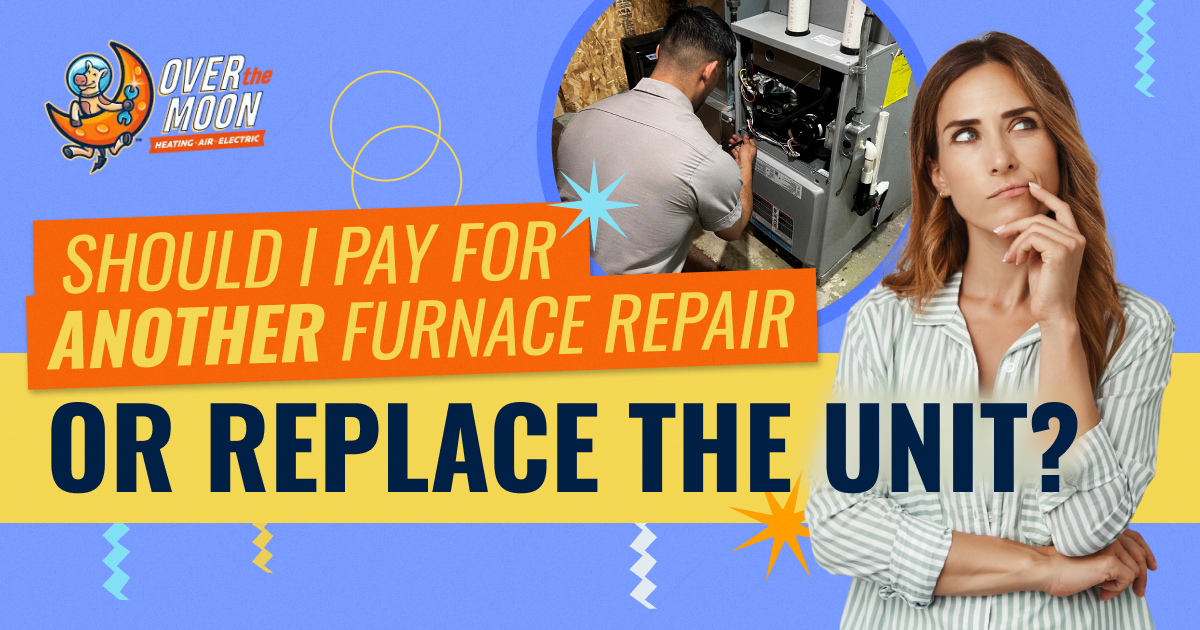Are you facing another furnace repair and wondering if it’s worth paying for? Replacing the unit can save you money over the long term. At Over the Moon, our furnace repair professionals can weigh the benefits of fixing or replacing a heating system. But the decision isn’t always simple. The age of your furnace, its overall performance, and your budget are some considerations.
When thinking about whether to invest in more repairs or to replace your furnace, consider the following questions:
What Is the Cost of the Repair?
If you’re deciding whether to pay for another furnace repair, the cost of repairs vs. replacement is the biggest consideration. In some cases, it can cost more to fix a unit than to purchase a new one (especially if multiple repairs are needed and replacement parts are hard to find). Generally, you should replace the furnace if the repair bill equals more than 50% of the cost of a new unit.
How Many Repairs Has Your Furnace Needed Lately?
Add up the number of repairs your furnace has required in the past two years. If you’ve had to replace one part after another, more parts will likely fail soon. It also gets more difficult to find replacement parts as a furnace ages. If it’s taking too long to find parts, that’ll be inconvenient on a frigid night. Consider replacing the unit to avoid any further breakdowns.
How Old Is Your Furnace?
A 15- to 20-year-old furnace, or older, can still meet your heating needs. However, this is a good time to begin shopping around for a new unit. And when you need a major repair, it can be a sign your furnace is failing. Waiting too long can result in seeking a replacement unit in a panic. Start early and you can plan it as a home improvement and find the right-sized, high-efficiency furnace that meets your needs for many years.
Is Your Home Comfortable?
A furnace repair may not be worth it if, no matter how much you adjust the thermostat, your home is never comfortable. Some comfort signs indicating it’s time to replace the furnace include:
- Your home never reaches the right temperature
- Some rooms are too cold and others too hot
- Your home is increasingly more dusty
- The air is excessively dry
- It’s always stuffy, or there are burning or gas odors
Are There Signs of Carbon Monoxide?
Your furnace may produce carbon monoxide if the burner flame is yellow instead of blue. There may also be streaks of soot on the unit, rusted flue pipes, and excess moisture on windows and other cold surfaces. Rust on the outside portion of the vent pipe and a weak or absent upward draft at the chimney can also be signs of trouble.
Be aware of the symptoms of carbon monoxide exposure as well, such as:
- Frequent headaches
- Burning sensation in the eyes and nose
- Nausea and vomiting
- Disorientation
- Flu-like symptoms
- Shortness of breath
- Rapid heartbeat
- Chest pain
- Loss of consciousness
To protect you and your family, have working carbon monoxide detectors near the furnace room, outside each bedroom, and on every floor of your home.
Is the Equipment in Good Condition?
While the condition of a furnace generally declines over the years, age alone isn’t the only consideration. Ongoing performance issues, a lack of comfort, and frequent repairs mean your furnace isn’t getting any younger. Also, think about how well-maintained the unit has been. A minor repair on a relatively new furnace is worth it. But if you’ve failed to schedule annual maintenance and your aging furnace has one issue after another, it’s probably not worth keeping.
Is It Still Under Warranty?
Equipment warranties make repairs much more affordable. If the warranty is still valid, another furnace repair will probably make sense. However, if it has expired or you somehow voided it, then it might be more cost-effective to replace the system. Always inquire about repair or replacement discounts, rebates, and tax incentives.
Are Your Energy Bills Going Up?
Your high energy bill may not be due to rising energy costs. A furnace loses efficiency with age, especially without proper maintenance. The unit will then run longer to provide the same amount of heat, using up more energy. The extra money you’re spending on energy each month can go towards paying for a newer, high-efficiency furnace. Compare your heating bills over time to determine if it’s worth paying another furnace repair bill or replacing the unit.
Is Your Furnace Noisy?
An old furnace that makes banging, rattling, popping, squealing, and other loud noises should be replaced. They could be a sign of a failing motor or other major part (plus excess strain on the entire system). If your furnace is also blowing cold air at times or turning on and off frequently, don’t bother repairing it. Noise is a common sign a furnace is near the end of its lifespan.
Have You Thought of Converting to a Different Type of Furnace?
If your older furnace is losing efficiency, start thinking of an alternative type of unit. For example, you might consider switching to a gas-fired system instead of an oil furnace to save money. Both come with disadvantages. Gas units require running a gas line and updating your chimney and vent system, while an oil furnace requires an above or below-ground oil tank. Electric furnaces have their benefits but often require updating wiring or replacing the main service panel.
The potential for long-term savings depends on available fuel sources and fuel type costs in your area.
Contact Over the Moon
Our licensed and experienced heating technicians can help you decide whether to pay for another furnace repair or replace the system. Annual maintenance can help your heating unit last longer and run more efficiently. But when your furnace is near the end of its life or requires a costly repair, we’ll help you select a model suited for your home and Wisconsin’s freezing winter climate. To learn more or schedule a furnace repair, replacement, or consultation/estimate, contact us today.

